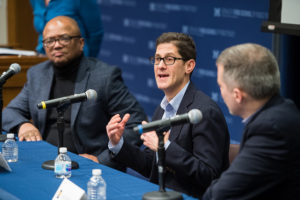The Ford School is home to numerous research centers on the leading edge of policy innovation. This week, we’re training the spotlight on the Program for Practical Policy Engagement. That name is most certainly a mouthful, so people usually refer to it as P3E. Led by Director Elisabeth Gerber, P3E works to form a bridge between the research being conducted here at the University of Michigan and the real-world policy arena. At P3E, the goal isn’t to simply study policy issues, but rather to take action to address them.
P3E’s mission revolves around three pillars: engaged learning, policy research, and policy impact.
- Engaged learning: P3E provides Ford students with invaluable opportunities to apply the lessons they’ve learned in the classroom to the real world. Students are partnered with community partners and government entities to make a lasting impact. In addition, students are paired in mentorship programs with distinguished policy professionals to receive guidance and support as they work within the community.
- Policy research: P3E encourages students to utilize their research skills to grapple with and propose solutions to the most pressing challenges facing our state, country, and world. Undergraduate and graduate research fellows work alongside public, nonprofit, and philanthropic community partners to delve into various policy issues.
- Policy impact: P3E’s “Getting Stuff Done” workshops bring together Ford School students with dedicated policy professionals from a wide variety of backgrounds to discuss how to put ideas into action. Workshops help students learn best practices for communicating your vision to stakeholders and the media, how to devise effective advocacy strategies, and so much more. All of this programming is aimed at giving Ford students the tools to pursue public policy for the public good.
P3E is at the forefront of policy change here in Michigan and around the country. While there are countless reasons to come to the Ford School, P3E and the other research centers are reminders of the important work being done here in Ann Arbor to make the world a better place.
That’s all for this week from “Inside the Ford School.” Stay tuned for more information about all that’s happening at Weill Hall!


